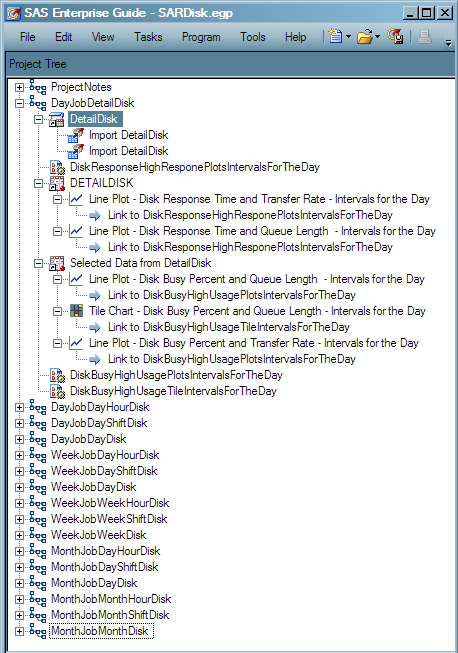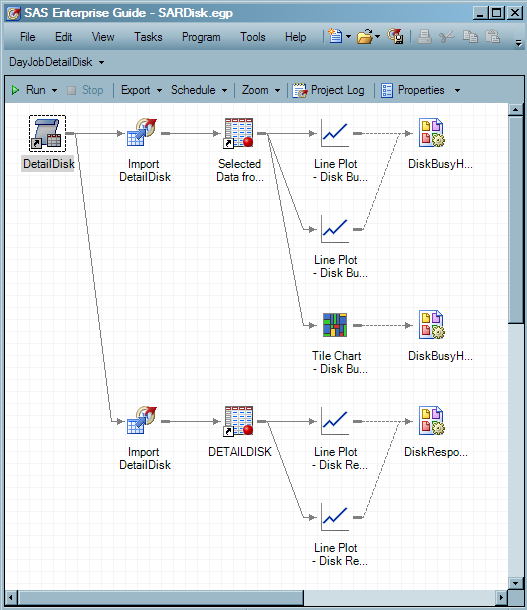About SAS Enterprise Guide Projects
What Are SAS Enterprise Guide Projects?
In SAS Enterprise Guide, you can work with projects,
process flows, branches, and tasks in order to manage the reporting
process.
Here are some of the
SAS Enterprise Guide components that are used in SAS IT Resource Management
reporting:
-
A process flow is a view within a project that shows a set of related data sets, tasks, and results that are linked and can be executed in a single stream. You can run a portion of the process flow or the entire process flow. A project can have multiple process flows that can be selected from the Project tree.
SAS Enterprise Guide Projects Supplied by SAS IT Resource Management
During installation,
SAS IT Resource Management provides several SAS Enterprise Guide projects.
They can be accessed by navigating to the location where you installed
SAS IT Resource Management on the client workstation. The projects
are located at
SASITResourceManagementSASEnterpriseGuideComponents\3.3.
For example, if you installed SAS IT Resource Management on a 64-bit
machine, the projects might be located at C:\Program
Files\SASHome\x86\SASITResourceManagementSASEnterpriseGuideComponents\3.3.
These projects,
when executed, generate reports that provide domain intelligence for
IT resources. The following two displays show the tree view and workspace
view for the supplied project called SARDisk.egp and the process flow
called DayJobDetailDisk.
Tip
Many supplied SAS Enterprise
Guide projects include Project Notes and Process Flow Notes. The Project
Notes file provides useful information about the reports that the
project creates for the adapter and domain category. The Process Flow
Notes file provides specific information about the columns and filters
that are used in the various process flows of the project. You can
use the information in these notes files to determine the types of
reports that the project creates and understand the general conventions
that are used to specify the reports.
Properties of Supplied SAS Enterprise Guide Reports
SAS Enterprise Guide
reports that are supplied by SAS IT Resource Management conform to
a set of reporting standards. These conventions, based on IT intelligence
and best practices, designate standard specifications for report footnotes,
titles, fonts, colors, filters, and so on.
Supplied projects use
process flow names that typically suggest which job the reports should
run in (for example, the daily job , the weekly job , or the monthly
job). The process flow name also indicates the name of the information
map that is used. The supplied SAS Enterprise Guide project called
SARDisk.egp includes a process flow named DayJobDetailDisk. The name
of this process flow suggests that it contains reports that should
run in a daily job and that use the DetailDisk information map. This
naming convention enables you to associate reports with their report
jobs and identify the information maps and SAS tables on which the
reports are based.
If you choose to create
or edit IT reports, then it is recommended that you follow these reporting
standards so that the reports that you create have the same look as
those that SAS IT Resource Management supplies.
For
more information, see Naming Standards for Reporting Objects and About Reporting Standards for SAS IT Resource Management Reports.

